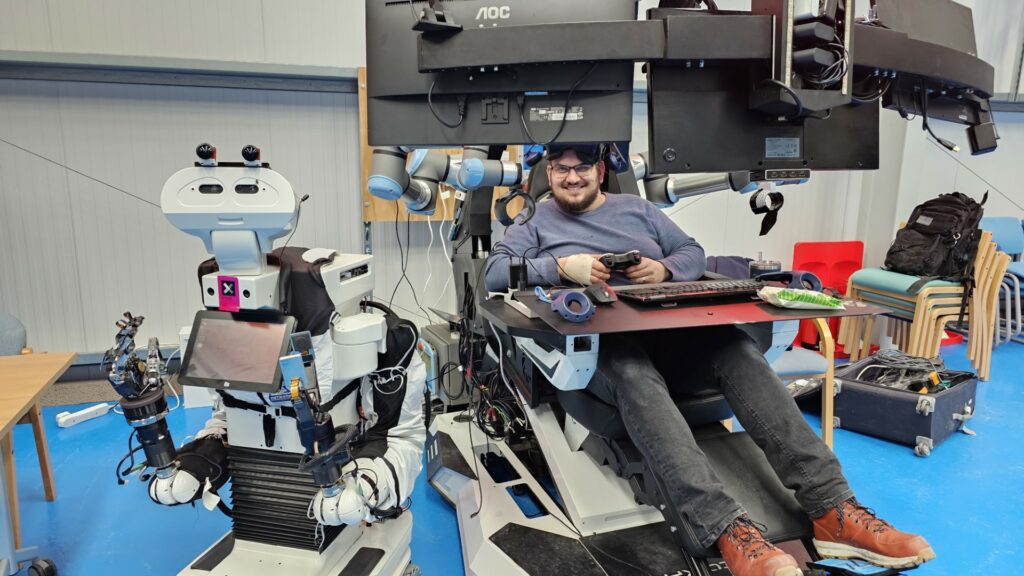
BOW Robotics (BOW) wants to revolutionise the robotics industry, unlocking potential for developers, businesses, and households worldwide. The Sheffield startup has created a universal software that can control any model of robot, irrespective of the manufacturer. We spoke to company founder, Daniel Camilleri, who revealed the ‘lightbulb moment’ that started it all (clue: it took place in an aquarium), why now is the time to make waves in robotics, and just some of the ways he sees robots impacting our day to day lives.
From frustration to innovation
BOW was founded in March 2020 by Daniel Camilleri, who was frustrated by the limitations of robot programming he’d experienced during his PhD at the University of Sheffield. After spending years working with and configuring a specific robot, he realised he had to rewrite his code from scratch when a new model was introduced. He says,
“It took me three months to learn the new model and realise I also had to reengineer my existing code for the new model, and I thought ‘Hang on, surely I’ve taken a wrong turn here, this shouldn’t be so hard’, but everyone that I asked said ‘no, this is how it is, you just have to suck it up.’ ”
This is a global industry-wide challenge as, currently, even robots from the same manufacturer typically use different software. And it’s hampering growth on a grand scale. Forbes reports that as of 2021, the robotics industry had seen an investment aggregate of roughly $20 billion from VCs alone but, despite this, major players in the robotics industry are struggling, with nine high-profile robotics companies declaring closure in 2022.
Daniel explains,
“Manufacturers cannot keep up with the demands of software production every time their robot is configured to perform a new task. They spend lots of time and money engineering code, and end up going out of business. This is why we haven’t seen robotics progress as much as it should.”
Adding to this, there is a small pool of robotics talent globally, with the majority of software developers finding themselves ‘locked out’ of the industry.
“As of 2023, there were 26.3 million known developers and, of these, only 150,000 can program robotics because there is a lack of consistency and transparency in the industry,” Daniel emphasises.
Recognising the significant gap in the market and its hindrance to global robotics industry growth, Daniel left his PhD to pursue a solution.
A universal language for robots
“I was actually in an aquarium in Chicago when the ‘lightbulb moment’ came. I’m looking at all the fish and thinking that they have different bodies, but are controlled by the same grey matter, the same nervous system. So, I have to find a way to link up all of the different ‘bodies’ to one universal language.”
Daniel likens BOW’s software to the Android™ of robotics, offering a universal language that can be applied across diverse manufacturers, similar to how Android operates on various smartphone brands.
Underpinned by neuroscience and psychology, BOW’s software is designed to equip robots with the ability to achieve objectives rather than simply performing a task. In addition, robots can be controlled remotely from anywhere in the world, equipping them for vital tasks such as bomb disposals, handling nuclear materials and performing medical procedures in hazardous conditions.
Daniel believes robots will play a crucial role in the service industry, outstripping manufacturing – where the focus for UK robotics has traditionally been – in the next five years.
Addressing concerns about job displacement, he notes that the integration of robots into industries such as social care can augment humanity rather than replace it. He says,
“The current standard of social care being delivered is not good enough, because there is a labour shortage. Robots can augment humanity, so people can still talk to their doctor, or a relative, or a psychologist through a robot, without them having to physically be in the room.”
Daniel also envisions robots entering our personal lives, explaining:
“I’d like to see a robot in every home, performing tasks such as cooking and cleaning. Giving time back to people.”
Starting up in ‘hard mode’
Starting up in the UK comes with its challenges, as the social acceptance of robotics, legislative complexities and investment restrictions pose hurdles to scaling.
“There’s a drive for the UK to become global leaders in science and technology. However, we’re finding that what politicians are saying is different to what the funders are saying, and we know it will be hard to achieve what we need to really scale in the UK.”
Nevertheless, BOW is determined to navigate what Daniel describes as “starting up in hard mode”. Operating out of Sheffield Technology Parks, BOW has found a home amidst a vibrant and growing robotics community, providing a conducive environment for cutting-edge research and development.
“Being in Sheffield is strategic for us. The presence of the AMRC, robotics departments of two universities, and Sheffield Robotics means there’s a lot of research happening here, making it an exciting place to be,” says Daniel.
The commercial release of BOW’s pioneering software is coming this Spring and we’re thrilled to have Daniel joining us at the next Sheffield Digital Showcase event on 19 March. So, why not join us, BOW and a range of robots to hear from Daniel and see the product in action before it is commercially released to the rest of the world? Book your spot here. You can stay up to date with BOW on the website: usebow.com and on LinkedIn.